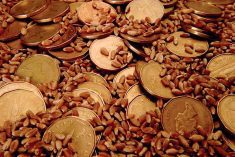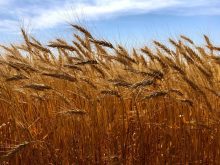Abu Dhabi | Reuters — A shipment of Canadian wheat rejected in Egypt over concerns it contained traces of ergot has been re-exported to Europe after Egypt’s agricultural quarantine rejected a petition from the supplier, trade sources said Thursday.
Egypt’s quarantine authority has rejected a series of wheat shipments over traces of the common grain fungus ergot causing concerns over the country’s tough new quality rules which have disrupted its massive wheat import programme.
“The vessel is already on its way to Europe as the petition was not accepted,” one Cairo-based trader said.
Read Also

Alberta crop conditions improve: report
Varied precipitation and warm temperatures were generally beneficial for crop development across Alberta during the week ended July 8, according to the latest provincial crop report released July 11.
The 8,000-tonne shipment, purchased in Egypt’s private sector, was rejected twice by the quarantine.
According to documents seen by Reuters, the shipment contained much less than the 0.05 per cent of ergot stipulated in Egypt’s wheat tender specifications.
Still, Saad Moussa, the head of the quarantine agency, has been applying a zero tolerance policy towards ergot despite both the supply and agriculture ministers saying they would accept 0.05 per cent, a percentage permissible elsewhere in the world.
“The worry is that after the agriculture ministry said there would be an ergot tolerance level such shipments should have been able to unload,” one European trader said.
“The dispute between the ministries does not seem to be over,” he said.
The crisis started when a 63,000-tonne French wheat shipment purchased by the state grain buyer GASC was rejected by the quarantine agency in December for having trace levels of ergot.
Even though the levels were within permissible limits stipulated by the country’s main state wheat buyer, the quarantine agency argued for a zero tolerance policy.
Confusion over Egypt’s position has since disrupted wheat tenders, raising the possibility of a grain shortage, which would pose a political problem for President Abdel Fattah al-Sisi as the population relies on highly subsidized bread.
Officials at Moussa’s quarantine authority use a 2001 regulation, which Reuters has seen, stipulating zero tolerance for ergot as their main guide and have ignored the Egyptian specifications of 2010.
In a bid to win back confidence, the ministries of supply and agriculture held a joint press conference on Feb. 7, assuring suppliers their wheat shipments can contain up to 0.05 per cent of ergot.
On Feb. 8, however, the Canadian wheat shipment received its second letter of rejection.
— Reporting for Reuters by Maha El Dahan in Cairo; additional reporting for Reuters by Michael Hogan in Hamburg and Valerie Parent in Paris.














